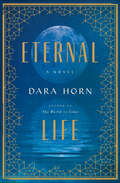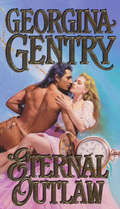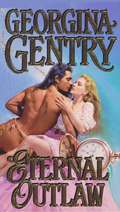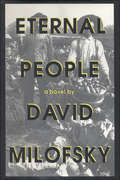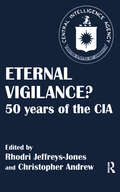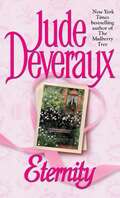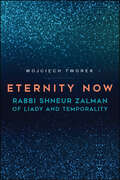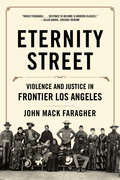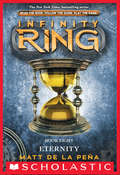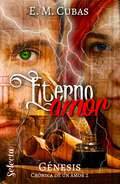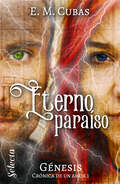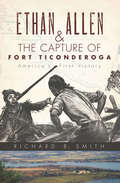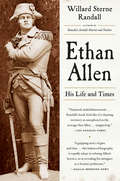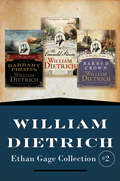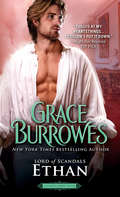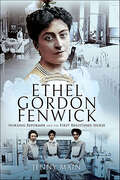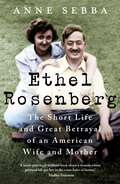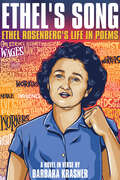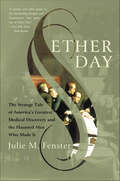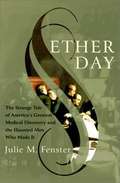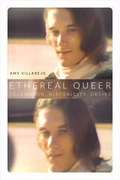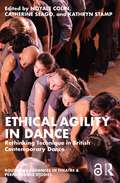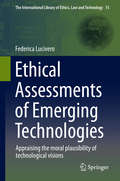- Table View
- List View
Eternal Life: A Novel
by Dara HornA New York Times Notable Book A Booklist Editors’ Choice A Chicago Public Library Best Book of the Year What would it really mean to live forever?Rachel is a woman with a problem: she can’t die. Her recent troubles—widowhood, a failing business, an unemployed middle-aged son—are only the latest in a litany spanning dozens of countries, scores of marriages, and hundreds of children. In the 2,000 years since she made a spiritual bargain to save the life of her first son back in Roman-occupied Jerusalem, she’s tried everything to free herself, and only one other person in the world understands: a man she once loved passionately, who has been stalking her through the centuries, convinced they belong together forever.But as the twenty-first century begins and her children and grandchildren—consumed with immortality in their own ways, from the frontiers of digital currency to genetic engineering—develop new technologies that could change her fate and theirs, Rachel knows she must find a way out.Gripping, hilarious, and profoundly moving, Eternal Life celebrates the bonds between generations, the power of faith, the purpose of death, and the reasons for being alive.
Eternal Lover
by Hannah Howell Richelle Mead Lynsay Sands Saranna DeWyldeParanormal romance fans rejoice! The sexy Scottish vampires of Eternal Lover by New York Times bestselling authors Lynsay Sands, Hannah Howell and Richelle Mead return in this reissued classic with a brand new, never before published story from rising paranormal romance star Saranna DeWylde! Theirs is a world of ancient desires and forbidden pleasures. They are men of mystery and women of seduction, wild creatures with the power to entrance and enchant, tease and tantalize. Enter their secret world, if you dare . . .The Yearning by Hannah Howell Alpin has lived for centuries with a lust that can never be quenched with mere physical pleasure. And then he meets Sophie whose own search for lasting love binds them together in a cloak of shimmering sensuality . . .City of Demons by Richelle Mead Seth cannot resist the intense sexual allure of his demon lover Georgina. Yet their love reaches beyond the physical, into a place of complete untamed surrender . . .Bitten by Lynsay Sands Keeran&’s existence as a vampire has taught him to accept a life without love—until he saves Emily from certain death. And suddenly he discovers the soul-searing passion he thought he&’d lost forever . . . Heart of the Mummy by Saranna DeWylde The Egyptian legend of He Who Endures fascinates archaeologist Dr. Kalila Blake. But her enigmatic colleague Dr. Seth Dakarai knows more about the warrior king—and about immortal desire—than she ever dreamed . . .
Eternal Outlaw
by Georgina Gentry"A master of the genre", said "Rendezvous", of this award-winning author. In this novel, Gentry sweeps readers into the turbulent American West with the passionate story of a man and a woman bound by desire--and destined to shatter the bonds of time.
Eternal Outlaw (Panorama of the Old West #17)
by Georgina GentryA DEAL WITH THE DEVILKansas 189's. Riding in Coffeyville with the notorious Dalton Gang, Johnny Logan never expected a simple bank robbery to go so murderously wrong. Limping away from the carnage, he finds himself facing death. . .and the devil himself. For eternal life, Johnny will agre to almost anything - even returning to scene of the crime every hundred years. At least until an angelic blond gives him a reason to regret his choice.AN ANGEL'S EMBRACEKansas 1999. Angelica Newland was still smarting from a bad marriage when she took a job with Logan Enterprises and found herself swept off her feed by her dakly handsome boss, the infamous corporate lion, John Logan. But when Logan's mysterious secrets plunge her into the past with him, they begin a desperate race against time- to reclaim Logan's soul. . .and the love they had found in each other's arms.
Eternal People: A Novel
by David MilofskyEternal People,/i> tells the story of Joseph Abrams, a Ukrainian Jew who finds his way to America at the end of the nineteenth-century. During a break from his studies in Russia, he returns to his shtetl in the Ukraine to find it is the target of a Cos
Eternal Vigilance?: 50 years of the CIA (Studies in Intelligence)
by Christopher Andrew Rhodri Jeffreys-JonesEternal Vigilance? seeks to offer reinterpretations of some of the major established themes in CIA history such as its origins, foundations, its treatment of the Soviet threat, the Iranian revolution and the accountability of the agency. The book also opens new areas of research such as foreign liaison, relations with the scientific community, use of scientific and technical research and economic intelligence. The articles are both by well-known scholars in the field and young researchers at the beginning of their academic careers. Contributors come almost equally from both sides of the Atlantic. All draw, to varying degrees, on recently declassified documents and newly-available archives and, as the final chapter seeks to show, all point the way to future research.
Eternamente Desprezada
by Éli Assunção Christina McKnightUm homem disposto a sacrificar tudo… Andrew Penton, o Marquês de Drake, é um homem acostumado a conseguir tudo o que quer, sem se importar com as consequências. Mas quando uma mulher misteriosa chama a sua atenção, não teve opção a não ser oferecer a ela tudo o que ele era. Uma mulher determinada a tomar tudo… Lady Lorelei de La Valette, filha do Comte de Epernon, é nova na sociedade de Londres e não era a dama que parecia ser. Sua vida tinha sido controlada desde o nascimento, mas ela ainda teria que decidir se o seu destino estava em seu país ou em seu coração. Um amor perdido para sempre…
Eternity (Montgomery/Taggert)
by Jude DeverauxThe ninth captivating historical romance in the Montgomery series from New York Times bestselling author Jude Deveraux.Carrie Montgomery had grown up with seven adoring older brothers, and she was used to getting her way rather easily. Joshua Greene was only looking for a hardworking, practical mail-order bride to help with the farm and feed and clothe his children. Yet from the moment Carrie saw his photograph, saw his devastatingly handsome, sorrowful smile, the petite and pampered beauty knew she was the perfect wife for him. Josh didn't see it that way. Wed by proxy, he refused to be charmed by his new bride's blond curls and effervescent laughter, or impressed by her trappings of wealth...even if his son and daughter believed she was a fairy princess come to life. He was furious—and ready to send her packing, until a near tragedy convinced him that her beauty was more than skin-deep. But even after he had yielded to the wild desire that surged between them, Josh could not admit how much he truly needed her. Then an old scandal threatened to re-emerge, and he realized that he could lose her forever....
Eternity Now: Rabbi Shneur Zalman of Liady and Temporality
by Wojciech TworekThe Habad movement, formed in eighteenth-century Belarus, has developed into one of the most influential streams of Hasidic Judaism. Drawing on both mystical sermons and legal writings of its founder, Rabbi Shneur Zalman of Liady (1745–1812), Eternity Now provides the first account of the historiosophical dimensions of early Habad doctrine. Challenging the commonly held view that Shneur Zalman was primarily concerned with supratemporal transcendence, Wojciech Tworek reveals the importance of time and history in his teachings. Tworek argues that the worldly dimensions of Shneur Zalman's thought were largely responsible for the rapid growth of Habad at the turn of the nineteenth century and fostered its transformation from an elitist circle into a mass movement. Tworek's readings of Hebrew and Yiddish sources demonstrate the implications of these ideas not only for male scholars but also for non-scholars, Jewish women, and even non-Jews. Philosophical and kabbalistic thought joined together to form a model of religious experience attractive to a broad audience, laying an ideological foundation for the missionary messianism that was to become a hallmark of Habad in the twentieth century.
Eternity Street: Violence and Justice in Frontier Los Angeles
by John Mack Faragher“John Mack Faragher is one fine writer, bringing early L.A. to life as the setting for all manner of horrific killings and gruesome justice. Eternity Street will keep you up at night ruminating on the roots of American violence.”—Richard Wightman Fox, University of Southern California, author of Lincoln’s Body: A Cultural History Eternity Street tells the story of a violent place in a violent time: the rise of Los Angeles from its origins as a small Mexican pueblo. In a masterful narrative, John Mack Faragher relates a dramatic history of conquest and ethnic suppression, of collective disorder and interpersonal conflict. Eternity Street recounts the struggle to achieve justice amid the turmoil of a loosely governed frontier, and it delivers a piercing look at the birth of this quintessentially American city. In the 1850s, the City of Angels was infamous as one of the most murderous societies in America. Saloons teemed with rowdy crowds of Indians and Californios, Mexicans and Americans. Men ambled down dusty streets, armed with Colt revolvers and Bowie knives. A closer look reveals characters acting in unexpected ways: a newspaper editor advocating lynch law in the name of racial justice; hundreds of Latinos massing to attack the county jail, determined to lynch a hooligan from Texas. Murder and mayhem in Edenic southern California. "There is no brighter sun…no country where nature is more lavish of her exuberant fullness," an Angeleno wrote in 1853. "And yet, with all our natural beauties and advantages, there is no country where human life is of so little account. Men hack one another to pieces with pistols and other cutlery as if God's image were of no more worth than the life of one of the two or three thousand ownerless dogs that prowl about our streets and make night hideous." This is L.A. noir in the act of becoming.
Eternity: Eternity (Infinity Ring #8)
by Matt de la PeñaThe New York Times bestselling series returns . . . and so does Matt de la Pena!Dak, Sera, and Riq have fixed the Great Breaks in history . . . but the SQ isn't beaten yet, and the biggest, boldest Infinity Ring adventure of all time has just begun!
Eterno amor (Génesis. Crónica de un amor #Volumen 2)
by E. M. CubasAlan y Liliana continúan la crónica de su vida. La esperada conclusión de «Génesis. Crónica de un amor». La historia quedó detenida al final de sus vivencias en la época clásica. Las últimas palabras que Eric y Eliza escucharon de la boca de Alan fueron: Yo viví en Alejandría cuando esta era la ciudad más resplandeciente del mundo conocido. Deseosos de conocer el resto de sus vidas se preparan para la nueva etapa. Alan entonces les habla de cómo fue escriba en un monasterio medieval y librero en la Cuenca del siglo XIII. Sus días felices en la Venecia del siglo XVIII, de sus desdichas en el París de la revolución o sus vivencias en Nueva York a principios del siglo XX. Sus recuerdos de las personas con las que convivieron y de sus muchas identidades, de los que los odiaron y de los que los amaron, de los lugares que marcaron sus vidas. Así continúa la travesía del escriba. Ya de vuelta en su presente, Alan se enfrentará a lo único que nunca ha podido controlar: Liliana. Y deberá decidir si una vida eterna con ella es más importante que su orgullo.
Eterno paraíso (Génesis. Crónica de un amor #Volumen 1)
by E. M. Cubas«Mi primera conciencia fue Ella. Así empezó nuestra existencia. Así me condené a un Amor Eterno. Fuimos creados inmortales, iguales y complementarios. Ella era el fuego y el aire. Yo la tierra y el agua. Tan necesarios entre ellos y tan opuestos entre sí». Cuando el experto en libros antiguos, Alan Garden, es requerido por su socio para analizar un manuscrito en una de las islas del Egeo no se imagina que ese viaje de trabajo le enfrentará a su pasado. Allí se reencontrará con Liliana, una mujer que siempre marcó su existencia y con la que le une algo más que el amor. Un suceso inesperado les obliga a contar su verdadera naturaleza a sus amigos, a hablarles de su vida en el paraíso, del abandono, de los encuentros y desencuentros ocurridos durante siglos. De su paso por la civilización sumeria, la egipcia o por el mundo greco romano. Alan les habla de la biblioteca de Alejandría en la que trabajó como escriba, del emperador Adriano al que lo unió una gran pasión. Y sobre todo les cuenta el valor del manuscrito que había ido a autentificar a la isla: el libro de Thot. Un libro que muchos a lo largo de la historia habían considerado mágico y esotérico. ¿Cómo sobrevivir al paso del tiempo y de la historia si eres inmortal? ¿Y si las historias sobre la Creación no fueran como las han contado?
Ethan Allen & the Capture of Fort Ticonderoga: America's First Victory (Military)
by Richard B. SmithThe author of Vermont Firsts and Other Claims to Fame examines the pivotal American Revolutionary War skirmish and the men behind it.In April 1775, a small band of men set out from Hartford and traveled swiftly north toward the shore of Lake Champlain, recruiting men to their expedition along the way. Within only a few days, this loyal group of volunteers arrived in Vermont and, joining forces with Ethan Allen and his legendary Green Mountain Boys, launched a daring attack to capture more than one hundred cannons stored at Fort Ticonderoga. In this comprehensive look at “America's First Victory,” Richard Smith traces the Patriots’ route from Connecticut, through the towns of western Massachusetts and the Berkshire hills and north to Bennington, Vermont, and Lake Champlain. He chronicles the rival expedition led by Benedict Arnold, his confrontation with Allen, and the surprise attack that changed the course of the American Revolution.
Ethan Allen: His Life and Times
by Willard Sterne RandallThe long-awaited biography of the frontier Founding Father whose heroic actions and neglected writings inspired an entire generation from Paine to Madison. On May 10, 1775, in the storm-tossed hours after midnight, Ethan Allen, the Revolutionary firebrand, was poised for attack. With only two boatloads of his scraggly band of Vermont volunteers having made it across the wind-whipped waters of Lake Champlain, he was waiting for the rest of his Green Mountain boys to arrive. But with the protective darkness quickly fading, Allen determined that he hold off no longer. While Ethan Allen, a canonical hero of the American Revolution, has always been defined by his daring, predawn attack on the British-controlled Fort Ticonderoga, Willard Sterne Randall, the author of Benedict Arnold, now challenges our conventional understanding of this largely unexamined Founding Father. Widening the scope of his inquiry beyond the Revolutionary War, Randall traces Allen's beginning back to his modest origins in Connecticut, where he was born in 1738. Largely self-educated, emerging from a relatively impoverished background, Allen demonstrated his deeply rebellious nature early on through his attraction to Deism, his dramatic defense of smallpox vaccinations, and his early support of separation of church and state. Chronicling Allen's upward struggle from precocious, if not unruly, adolescent to commander of the largest American paramilitary force on the eve of the Revolution, Randall unlocks a trove of new source material, particularly evident in his gripping portrait of Allen as a British prisoner-of-war. While the biography reacquaints readers with the familiar details of Allen's life--his capture during the aborted American invasion of Canada, his philosophical works that influenced Thomas Paine, his seminal role in gaining Vermont statehood, his stirring funeral in 1789--Randall documents that so much of what we know of Allen is mere myth, historical folklore that people have handed down, as if Allen were Paul Bunyan. As Randall reveals, Ethan Allen, a so-called Robin Hood in the eyes of his dispossessed Green Mountain settlers, aggrandized, and unabashedly so, the holdings of his own family, a fact that is glossed over in previous accounts, embellishing his own best-selling prisoner-of-war narrative as well. He emerges not only as a public-spirited leader but as a self-interested individual, often no less rapacious than his archenemies, the New York land barons of the Hudson and Mohawk Valleys. As John E. Ferling comments, "Randall has stripped away the myths to provide as accurate an account of Allen's life as will ever be written." The keen insights that he produces shed new light, not only on this most enigmatic of Founding Fathers, but on today's descendants of the Green Mountain Boys, whose own political disenfranchisement resonates now more than ever.
Ethan: Lord of Scandals
by Grace BurrowesEthan Grey's life was shattered... Estranged from his family, widowed after an unhappy marriage, and weary from fighting his troubled past, Ethan Grey now has a chance for redemption. His son's beautiful and remarkable governess might help him battle his ghosts, but it's been a long time since he let himself get close to anyone. Alice Portman has more in common with Ethan than she can comfortably admit. For now, she's satisfied with helping him rebuild his life and family. But the dangerous past is about to catch up with them both. An unforgettable Regency tale of two wounded people who get another chance at love. Award-winning New York Times and USA Today bestselling author Grace Burrowes's extraordinary writing will immerse you in a Regency world unlike any you've experienced.The Lonely Lords series:Darius (Book 1) Beckman (Book 2) Ethan (Book 3) Nicholas (Book 4) Gabriel (Book 5) Gareth (Book 6) Andrew (Book 7) Douglas (Book 8) David (Book 9)
Ethel Gordon Fenwick: Nursing Reformer and the First Registered Nurse (Trailblazing Women)
by Jenny MainA great nursing reformer, Ethel Gordon Fenwick was born before the age of the motor car and died at the start of the jet age. When she began her career, nursing was a vocation, unregulated with a dangerous variety of standards and inefficiencies. A gifted nurse, Ethel worked alongside great medical men of the day and, aged 24, she became the youngest matron of St Bartholomew’s hospital London, where she instigated many improvements. At that time, anyone could be called a nurse, regardless of ability. Ethel recognized that for the safety of patients, and of nurses, there must be an accepted standard of training, with proof of qualification provided by a professional register. Often contentious, Ethel was a determined woman. She fought for nearly thirty years to achieve a register to ensure nurses were qualified, respected professionals. A suffragist and journalist, she travelled to America where she met like-minded nursing colleagues. As well as helping to create the International Council of Nurses, and the Royal British Nurses Association, she was also instrumental in organising nurses and supplies during the Graeco-Turkish War, and was awarded several medals for this work. Thanks to her long campaign for registration, a year after her death nurses were ready to take their place alongside other professionals when the National Health Service began in 1948.
Ethel Rosenberg: A Cold War Tragedy
by Anne Sebba"Totally riveting. I couldn't put it down" VICTORIA HISLOP"Masterful, original and painfully gripping" PHILIPPE SANDS"A heart-piercingly brilliant book about a woman whose personal life put her in the cross-hairs of history" HADLEY FREEMAN"I don't think I've ever read a book that has moved me more" ANTHONY HOROWITZ"A brilliant and fresh take on a famous case" SIMON SEBAG MONTEFIOREEthel Rosenberg's story has been called America's Dreyfus Affair: a catastrophic failure of humanity and justice that continues to haunt the national conscience, and is still being played out with different actors in the lead roles today.On 19th June 1953 Ethel Rosenberg became the first woman in the US to be executed for a crime other than murder. She was thirty-seven years old and the mother of two small children. Yet even today, at a time when the Cold War seems all too resonant, Ethel's conviction for conspiracy to commit espionage on behalf of the Soviet Union makes her story still controversial. This is an important moment to recount not simply what FBI Director J. Edgar Hoover called the 'trial of the century', but also a timeless human story of a supportive wife, loving mother and courageous idealist who grew up during the Depression with aspirations to become an opera singer. Instead, she found herself battling the social mores of the 1950s and had her life barbarically cut short on the basis of tainted evidence for a crime she almost certainly did not commit.Anne Sebba's masterly biography makes full use of the dramatic prison letters Ethel exchanged with her husband, lawyer and psychotherapist over a three-year period. Sebba has also interviewed Ethel's two sons and others who knew her, including a fellow prisoner. Ethel's tragic story lays bare a nation deeply divided and reveals what happens when a government motivated by fear tramples on the rights of its citizens.
Ethel's Song: Ethel Rosenberg’s Life in Poems
by Barbara KrasnerConvicted of conspiracy to commit espionage for the Soviet Union against the United States, Ethel Rosenberg shares the story of her beliefs, loves, secrets, betrayals, and injustices in this compelling YA novel in verse.In 1953, Ethel Rosenberg, a devoted wife and loving mother, faces the electric chair. People say she&’s a spy, a Communist, a red. How did she get here? In a series of heart-wrenching poems, Ethel tells her story. The child of Jewish immigrants, Ethel Greenglass grows up on New York City&’s Lower East Side. She dreams of being an actress and a singer but finds romance and excitement in the arms of the charming Julius Rosenberg. Both are ardent supporters of rights for workers, but are they spies? Who is passing atomic secrets to the Soviets? Why does everyone seem out to get them? This first book for young readers about Ethel Rosenberg is a fascinating portrait of a commonly misunderstood figure from American history, and vividly relates a story that continues to have relevance today.
Ether Day: The Strange Tale of America's Greatest Medical Discovery and the Haunted Men Who Made It
by Julie M. FensterA fascinating and entertaining look at the men behind the first surgical use of anesthesia—and the price they paid for their breakthrough.On Friday, October 16, 1846, only one operation was scheduled at Massachusetts General Hospital....That day in Boston, the operation was the routine removal of a growth from a man's neck. But one thing would not be routine: instead of using pulleys, hooks, and belts to subdue a patient writhing in pain, this crucial operation would be the first performed under a general anesthetic. No one knew whether the secret concoction would work. Some even feared it might kill the patient.This engrossing book chronicles what happened that day and during its dramatic aftermath. In a vivid history that is stranger than fiction, Ether Day tells the story of the three men who converged to invent the first anesthesia—and the war of ego and greed that soon sent all three men spiraling wildly out of control.
Ether Day: The Strange Tale of America's Greatest Medical Discovery and the Haunted Men Who Made it
by Julie M. FensterEther Day is the unpredictable story of America's first major scientific discovery -- the use of anesthesia -- told in an absorbing narrative that traces the dawn of modern surgery through the lives of three extraordinary men. Ironically, the "discovery" was really no discovery at all: Ether and nitrous oxide had been known for more than forty years to cause insensitivity to pain, yet, with names like "laughing gas, " they were used almost solely for entertainment. Meanwhile, patients still underwent operations during which they saw, heard, and felt every cut the surgeon made. The image of a grim and grisly operating room, like the one in Mary Shelley's Frankenstein, was in fact starkly accurate in portraying the conditions of surgery before anesthesia. With hope for relief seemingly long gone, the breakthrough finally came about by means of a combination of coincidence and character, as a cunning Boston dentist crossed paths with an inventive colleague from Hartford and a brilliant Harvard-trained physician. William Morton, Horace Wells, and Charles Jackson: a con man, a dreamer, and an intellectual. Though Wells was crushed by derision when he tried to introduce anesthetics, Morton prevailed, with help from Jackson. The result was Ether Day, October 16, 1846, celebrated around the world. By that point, though, no honor was enough. Ether Day was not only the dawn of modern surgery, but the beginning of commercialized medicine as well, as Morton patented the
Ethereal Queer: Television, Historicity, Desire
by Amy VillarejoIn Ethereal Queer, Amy Villarejo offers a historically engaged, theoretically sophisticated, and often personal account of how TV representations of queer life have changed as the medium has evolved since the 1950s. Challenging the widespread view that LGBT characters did not make a sustained appearance on television until the 1980s, she draws on innovative readings of TV shows and network archives to reveal queer television's lengthy, rich, and varied history. Villarejo goes beyond concerns about representational accuracy. She tracks how changing depictions of queer life, in programs from Our Miss Brooks to The L Word, relate to transformations in business models and technologies, including modes of delivery and reception such as cable, digital video recording, and online streaming. In so doing, she provides a bold new way to understand the history of television.
Ethical Agility in Dance: Rethinking Technique in British Contemporary Dance (Routledge Advances in Theatre & Performance Studies)
by Noyale Colin Catherine Seago Kathryn StampThis edited collection examines the potential of dance training for developing socially engaged individuals capable of forging ethical human relations for an ever-changing world and in turn frames dance as a fundamental part of human experience. This volume draws together a range of critical voices to reflect the inclusive potential of dance. The contributions offer perspectives on contemporary dance training in Britain from dance educators, scholars, practitioners and artists. Through examining the politics, values and ethics of learning dance today, this book argues for the need of a re-assessment of the evolving practices in dance training and techniques. Key questions address how the concept of ‘technique’ and associated systems of training in dance could be redefined to enable the collaboration of skills and application of ideas necessary to twenty-first-century dance. The editors present these ideas in different modes of writing. This collection of essays, conversations and manifestos offers a way to explore, debate and grasp the shifting values of contemporary dance. Examining these values in the applied field of dance reveals a complex and contrasting range of ideas, encompassing broad themes including the relationships between individuality and collectivity, rigour and creativity, and virtuosity and inclusivity. This volume points to ethical techniques as providing a way of navigating these contrasting values in dance. It serves as an invaluable resource for academics as well as practitioners and students.
Ethical Assessments of Emerging Technologies
by Federica LuciveroThis book systematically addresses the issue of assessing the normative nature of visions of emerging technologies in an epistemologically robust way. In the context of democratic governance of emerging technologies, not only it is important to reflect on technologies' moral significance, but also to address their emerging and future oriented character. The book proposes an original approach to deal with the issue of "plausible" ethical evaluation of new technologies. Taking its start from current debates about Technology Assessment, the proposed solution emerges as a combination of theoretical and methodological insights from the fields of Philosophy of Technology, Science and Technology Studies and a normative justification based on pragmatist ethics. The book's main contribution is to engage a diverse and interdisciplinary audience (ethicists, philosophers, social scientists, technology assessment researchers and practitioners) in a reflection concerning the epistemological challenges that are associated to the endeavour of appraising the moral significance of emerging technologies in the attempt of democratically governing them. It brings together concepts and methodologies from different disciplines and shows their synergy in applying them to two specific case studies of emerging biomedical technologies.
